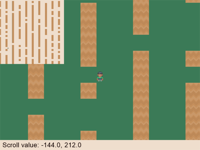迷你地图#

这个例子展示了如何使用帧缓冲区创建一个‘迷你贴图’。
minimap.py#
1 2 3 4 5 6 7 8 9 10 11 12 13 14 15 16 17 18 19 20 21 22 23 24 25 26 27 28 29 30 31 32 33 34 35 36 37 38 39 40 41 42 43 44 45 46 47 48 49 50 51 52 53 54 55 56 57 58 59 60 61 62 63 64 65 66 67 68 69 70 71 72 73 74 75 76 77 78 79 80 81 82 83 84 85 86 87 88 89 90 91 92 93 94 95 96 97 98 99 100 101 102 103 104 105 106 107 108 109 110 111 112 113 114 115 116 117 118 119 120 121 122 123 124 125 126 127 128 129 130 131 132 133 134 135 136 137 138 139 140 141 142 143 144 145 146 147 148 149 150 151 152 153 154 155 156 157 158 159 160 161 162 163 164 165 166 167 168 169 170 171 172 173 174 175 176 177 178 179 180 181 182 183 184 185 186 187 188 189 190 191 192 193 194 195 196 197 198 199 200 201 202 | """ Work with a mini-map Artwork from https://kenney.nl If Python and Arcade are installed, this example can be run from the command line with: python -m arcade.examples.minimap """ import random from uuid import uuid4 import arcade from pyglet.math import Vec2 SPRITE_SCALING = 0.5 DEFAULT_SCREEN_WIDTH = 800 DEFAULT_SCREEN_HEIGHT = 600 SCREEN_TITLE = "Minimap Example" # How many pixels to keep as a minimum margin between the character # and the edge of the screen. VIEWPORT_MARGIN = 220 # How fast the camera pans to the player. 1.0 is instant. CAMERA_SPEED = 0.1 # How fast the character moves PLAYER_MOVEMENT_SPEED = 7 # Background color must include an alpha component MINIMAP_BACKGROUND_COLOR = arcade.get_four_byte_color(arcade.color.ALMOND) MINIMAP_WIDTH = 256 MINIMAP_HEIGHT = 256 MAP_WIDTH = 2048 MAP_HEIGHT = 2048 class MyGame(arcade.Window): """ Main application class. """ def __init__(self, width, height, title): """ Initializer """ super().__init__(width, height, title, resizable=True) # Sprite lists self.player_list = None self.wall_list = None # Mini-map related # List of all our minimaps (there's just one) self.minimap_sprite_list = None # Texture and associated sprite to render our minimap to self.minimap_texture = None self.minimap_sprite = None # Set up the player self.player_sprite = None self.physics_engine = None # Camera for sprites, and one for our GUI self.camera_sprites = arcade.Camera(DEFAULT_SCREEN_WIDTH, DEFAULT_SCREEN_HEIGHT) self.camera_gui = arcade.Camera(DEFAULT_SCREEN_WIDTH, DEFAULT_SCREEN_HEIGHT) def setup(self): """ Set up the game and initialize the variables. """ # Sprite lists self.player_list = arcade.SpriteList() self.wall_list = arcade.SpriteList() # Set up the player self.player_sprite = arcade.Sprite(":resources:images/animated_characters/female_person/" "femalePerson_idle.png", scale=0.4) self.player_sprite.center_x = 256 self.player_sprite.center_y = 512 self.player_list.append(self.player_sprite) # -- Set up several columns of walls for x in range(0, MAP_WIDTH, 210): for y in range(0, MAP_HEIGHT, 64): # Randomly skip a box so the player can find a way through if random.randrange(5) > 0: wall = arcade.Sprite(":resources:images/tiles/grassCenter.png", SPRITE_SCALING) wall.center_x = x wall.center_y = y self.wall_list.append(wall) self.physics_engine = arcade.PhysicsEngineSimple(self.player_sprite, self.wall_list) # Set the background color arcade.set_background_color(arcade.color.AMAZON) # Construct the minimap size = (MINIMAP_WIDTH, MINIMAP_HEIGHT) self.minimap_texture = arcade.Texture.create_empty(str(uuid4()), size) self.minimap_sprite = arcade.Sprite(center_x=MINIMAP_WIDTH / 2, center_y=self.height - MINIMAP_HEIGHT / 2, texture=self.minimap_texture) self.minimap_sprite_list = arcade.SpriteList() self.minimap_sprite_list.append(self.minimap_sprite) def update_minimap(self): proj = 0, MAP_WIDTH, 0, MAP_HEIGHT with self.minimap_sprite_list.atlas.render_into(self.minimap_texture, projection=proj) as fbo: fbo.clear(MINIMAP_BACKGROUND_COLOR) self.wall_list.draw() self.player_sprite.draw() def on_draw(self): """ Render the screen. """ # This command has to happen before we start drawing self.clear() # Select the camera we'll use to draw all our sprites self.camera_sprites.use() # Draw all the sprites. self.wall_list.draw() self.player_list.draw() # Select the (unscrolled) camera for our GUI self.camera_gui.use() # Update the minimap self.update_minimap() # Draw the minimap self.minimap_sprite_list.draw() # Draw the GUI arcade.draw_rectangle_filled(self.width // 2, 20, self.width, 40, arcade.color.ALMOND) text = f"Scroll value: {self.camera_sprites.position[0]:4.1f}, {self.camera_sprites.position[1]:4.1f}" arcade.draw_text(text, 10, 10, arcade.color.BLACK_BEAN, 20) def on_key_press(self, key, modifiers): """Called whenever a key is pressed. """ if key == arcade.key.UP: self.player_sprite.change_y = PLAYER_MOVEMENT_SPEED elif key == arcade.key.DOWN: self.player_sprite.change_y = -PLAYER_MOVEMENT_SPEED elif key == arcade.key.LEFT: self.player_sprite.change_x = -PLAYER_MOVEMENT_SPEED elif key == arcade.key.RIGHT: self.player_sprite.change_x = PLAYER_MOVEMENT_SPEED def on_key_release(self, key, modifiers): """Called when the user releases a key. """ if key == arcade.key.UP or key == arcade.key.DOWN: self.player_sprite.change_y = 0 elif key == arcade.key.LEFT or key == arcade.key.RIGHT: self.player_sprite.change_x = 0 def on_update(self, delta_time): """ Movement and game logic """ # Call update on all sprites (The sprites don't do much in this # example though.) self.physics_engine.update() # Scroll the screen to the player self.scroll_to_player() def scroll_to_player(self): """ Scroll the window to the player. """ # Scroll to the proper location position = Vec2(self.player_sprite.center_x - self.width / 2, self.player_sprite.center_y - self.height / 2) self.camera_sprites.move_to(position, CAMERA_SPEED) def on_resize(self, width, height): """ Resize window Handle the user grabbing the edge and resizing the window. """ self.camera_sprites.resize(int(width), int(height)) self.camera_gui.resize(int(width), int(height)) def main(): """ Main function """ window = MyGame(DEFAULT_SCREEN_WIDTH, DEFAULT_SCREEN_HEIGHT, SCREEN_TITLE) window.setup() arcade.run() if __name__ == "__main__": main() |